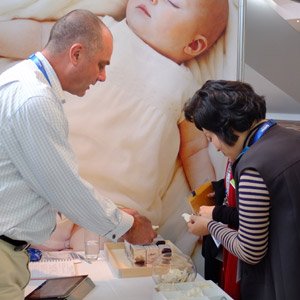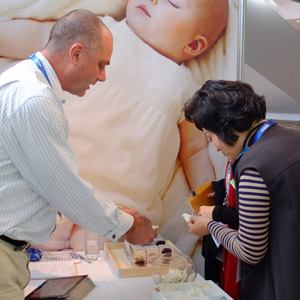
IWTO Wool Round Table to discuss sustainability
Wool’s credentials as a textile fibre that promotes health and wellbeing were presented by Australian Wool Innovation (AWI) at the International Federation for Home Economics (IFHE) World Congress this week in Melbourne.

20th July 2012
Innovation in Textiles
|
Melbourne
 Wool’s credentials as a textile fibre that promotes health and wellbeing were presented by Australian Wool Innovation (AWI) at the International Federation for Home Economics (IFHE) World Congress this week in Melbourne.
Wool’s credentials as a textile fibre that promotes health and wellbeing were presented by Australian Wool Innovation (AWI) at the International Federation for Home Economics (IFHE) World Congress this week in Melbourne.
AWI’s group manager of market intelligence and reporting, Dr Paul Swan told delegates that the clothing and interior textiles sectors are being influenced by the consumer megatrend towards lifestyles of health and sustainability, and that while pre-existing research shows that wool has a great story to tell, there is active research underway to strengthen these environmental credentials.
“Science is showing that – as well as being a natural, renewable and biodegradable fibre – wool bedding and sleepwear appear to promote a better night’s sleep, and fine wool knitwear can assist people that suffer from particular types of skin conditions,” Dr Swan said.
“Consistent with earlier science findings, the early results from an AWI-funded study undertaken by the University of Sydney are showing that wool sleeping apparel and bedding increases total sleep time, promotes sleep onset and improves sleep efficiency.”
“In hot (29° Celsius) conditions, wearing wool sleepwear saw participants in the study sleep significantly longer, reflecting faster sleep onset and waking up less frequently. In both cold (17° Celsius) and neutral (22° Celsius) conditions, the combination of wool sleepwear and bedding saw participants have a more efficient sleep compared to when tested using non-wool sleepwear and bedding.”
Early results of another AWI-funded study, under way with the Queensland Institute of Dermatology, are said to be showing that wearing fine Merino knitwear assists sufferers of dermatitis conditions.
“Merino wool has moisture and temperature management properties, and naturally assists regulation of body temperature. The inherent breathability and active moisture management properties of the fibre also help prevent the skin from becoming clammy, which can provide a more comfortable environment,” Dr Swan explained.
By building the scientific credentials of wool, AWI says it is assisting manufacturers and retailers of wool products to show their customers that wool should be considered as a logical part of a lifestyle of health and sustainability.
“A major focus of our program is validating and communicating the health and wellbeing benefits of wool products. There is a strong trend in the market towards healthy and environmentally friendly products, and wool’s natural attributes make it very suitable as an integral part of everyone’s health regime.”
The IFHE is a worldwide organisation focused on home economics and consumer studies. It is an international non-governmental organisation, having consultative status with the United Nations. The 2012 World Congress was held in the Pacific Region for the first time in the 104-year history of the IFHE. IFHE world congresses have attracted up to 2000 delegates from up to 80 countries.

Business intelligence for the fibre, textiles and apparel industries: technologies, innovations, markets, investments, trade policy, sourcing, strategy...
Find out more